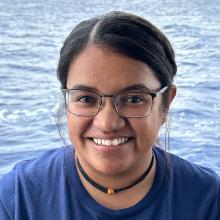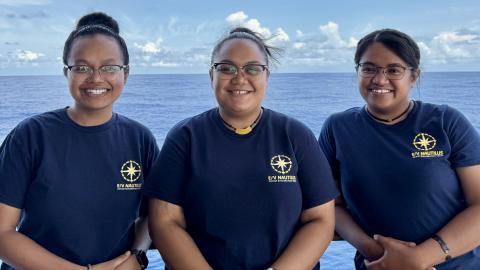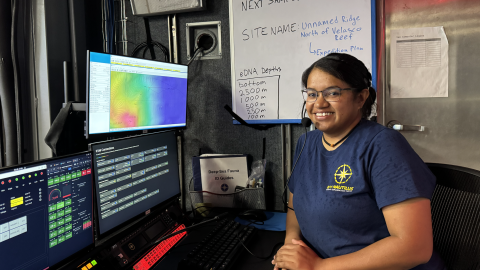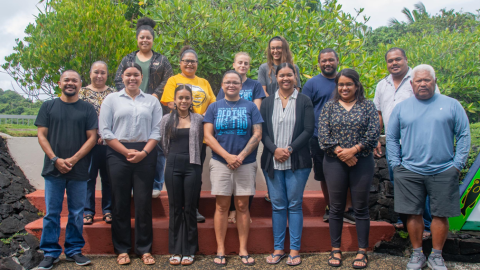
Meangeldil Ayla Azuma Malsol
Tell us about your work/ research. What kinds of things do you do?
During my Master's Degree Program, my research focused on marine debris in coral reefs. With the help of my colleagues/labmates, we did a quantitative assessment of marine debris in the coral reefs of Okinawa Island using standardized methods that can hopefully be used in the local coral reef conservation efforts over time. These methods included conducting SCUBA diving surveys to systematically monitor the quantity and types of debris that are accumulating in the reef areas. Pollution indices were also evaluated to assess the cleanliness and plastic abundance of a coral reef area. Because our knowledge of the types and amount of debris in reefs remains poorly understood, as most of the focus has been on debris stranded on beaches, the goal was to highlight the magnitude and the extent of the problem within the reefs to raise awareness and guide conservation efforts. As we may all know, we live in the plastic era, so as expected, my results highlighted the ubiquity of plastics found in the area. While also indicating the composition of each debris, we found that fishing lines were the most abundant, followed by unclassified plastic fragments. Single-use items were also recorded. So with these results, the aim is to provide the necessary information to guide targeted conservation measures to properly manage waste, and reducing the amount leaking into the marine environment. These may include proposing sustainable alternatives, or proposing bans on specific items.
What sparked your initial interest in your career?
Growing up in a small island like Palau, the ocean was always a huge part of our livelihood. As a result, ocean conservation was the norm in the community, as it was embedded in our culture at a young age, and it gave a deep sense of connection to the marine environment. While observing the community and how they were careful of their resources, and seeing their passion towards what we as an island people have been blessed with, it planted a seed in what I wanted to do in the future, which is to be involved in conservation. With that engraved in my mind, it shaped my career path, and encouraged my dedication to want to be involved in preserving and conserving our marine ecosystems.
Who influenced you or encouraged you the most?
My family really influenced and encouraged me the most. They allowed me to explore the different study/career choices out there especially when I first moved away from home after high school. They allowed me to learn to make my own decisions in choosing what I wanted to do, and bearing with me in all the different paths I took in this journey, and I am deeply grateful for their constant encouragement through it all. Also, I have to acknowledge that ALL the people in my life that I have known or met along the way have influenced, encouraged, and shaped who I am as a person today, both in my personal life and my educational/career choices. But I beieve that if I were to fully answer this question, I would have an endless list of who influenced/encouraged me the most.
What element of your work/ study do you think is the most fascinating?
I loved the fact that my studies allowed me to do a lot of scuba diving and snorkeling. It has been so much fun to dive around Okinawa Island and while doing field work for what I am passionate about, I also got to do a lot of sightseeing as a bonus. I also had the pleasure of collaborating with other colleagues, labmates, and friends with similar passions toward the ocean, and learning about their research really helped expand my knowledge and curiosity, as well as improving my skills in the research and field work area.
How did you get involved with Ocean Exploration Trust? How did you become part of the expedition team?
I first heard of the Ocean Exploration Trust through a colleague at the Palau International Coral Reef Center. I was truly inspired when I saw the kind of work she got involved with on one of the expeditions, so I was super excited when they shared an opportunity to apply to be on one of the expeditions. Furthermore, my supervisor and my friends who have experienced deep sea exploration encouraged me to apply to expand my knowledge and gain new and valuable skills.
What other jobs led you to your current career?
I've been blessed to have many opportunities along the way that led me to where I am today. While I always knew I wanted to be involved in marine conservation or marine science in general, I took many detours to really confirm that desire. Throughout undergrad, I explored psychology and sociology and confirmed that it wasn't for me. Then I finally dove into biology. This allowed me to explore many topics on this subject, just to confirm what I had already known, which is to dive deeper into marine science. So while pursuing a degree in Biology, it allowed me to get an internship (turned full-time) in Palau Conservation Society as a program officer in the Conservation and Protected Areas Program during my gap years. This ultimately led me to where I am today in my current studies in marine science, with a research study more focused towards marine conservation, and is what will aid in guiding my future career choices and how to apply the experiences and skills I have gained to help my country in this area.
What are your degrees and certifications?
Associate Degree of Science in Psychology, Sociology, and Social Sciences - Lassen Community College 2017
Bachelor of Science in Biology - Simpson University 2020
Master of Science in Chemistry, Biology, and Marine Sciences - University of the Ryukyus 2024
PADI Advanced Open Water Diver/Enriched Air Diver
What are your hobbies?
I have an endless list of hobbies, but to name a few, I enjoy scuba diving, hiking, reading, catching movies, karaoke with friends, or just going for a drive to find places I have never been. Pretty much any activity that feels right in a given moment.
What advice would you give someone who wants to have a career like yours?
I learned the hard way of delaying the ultimate goal of being in my current educational career, as I explored many topics to confirm what I already knew and wanted. I was afraid and intimidated as I was an inexperienced, fresh out of high school, small island girl moving away to a big unknown world outside, so I ended up looking elsewhere because I was too afraid to fail while reaching for my goal. But, take it from me, don't let the fear of the unknown or failure hold you back. Embrace it and use it for exploration and growth. But also keep in mind that it is okay to take detours and explore different paths, because, in the end, the experiences you will gain will be an opportunity to grow and the lessons you'll learn will be invaluable in your career choices or aspirations. In addition, networking and collaboration was huge throughout my journey, so always be open to learning and growing because you can learn so much when working with others, while also being challenged and inspired by them. Lastly, ask for help when you need it and don't hesitate. You are blessed to know people from many backgrounds and with different experiences that are willing to help you.
What excites me the most about this mission is the chance to dive into the mysteries of the ocean, and to witness firsthand the difference in the biodiversity it offers compared to nearshore shallow waters, as well as the differences in benthic cover. I am also excited for the possibility of working along side experts in the field and to learn from them.
Expeditions
Meangeldil Ayla participated in the following Ocean Exploration Trust expeditions:



